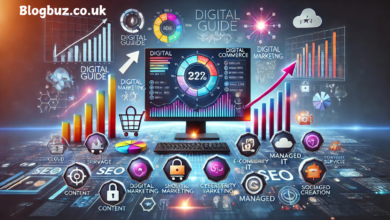The Impact of AI on the Evolution of Online Marketing Strategies

The digital marketing world is experiencing an undeniable shift as artificial intelligence (AI) integrates more deeply into its processes. From personalized content delivery to automated customer service, AI is no longer just a buzzword but a game-changer in how businesses engage with their audiences. In this post, we’ll explore how AI is revolutionizing online marketing and what businesses need to know to stay ahead of the curve.
1. Personalized Marketing Experiences
One of the most significant ways AI is reshaping online marketing is through its ability to personalize customer experiences. Personalization has been a key marketing tactic for years, but AI is now taking it to the next level. AI analyzes massive amounts of data to identify patterns in consumer behavior, preferences, and interactions. This allows businesses to deliver more targeted content, product recommendations, and offers, ensuring that each customer receives an experience tailored to their individual needs.
For example, AI-powered recommendation engines—used by companies like Amazon and Netflix—suggest products or shows based on past behaviors, significantly enhancing customer satisfaction. With AI, businesses can even predict what a customer might need before they realize it themselves, creating a more proactive and responsive marketing strategy.
2. Enhanced Customer Insights and Analytics
In the age of data, AI is a powerful tool for uncovering insights that were once too complex to grasp. It can sift through vast datasets and identify patterns that might otherwise go unnoticed. This enables marketers to make more informed decisions about their strategies, from optimizing ad spend to determining which type of content resonates best with specific segments.
With AI, businesses can track a customer’s journey across multiple touchpoints, gather real-time data, and make adjustments in an instant. These insights can be used to refine marketing campaigns, improve product development, and ultimately drive better customer engagement. AI is, in essence, helping businesses understand their customers on a deeper level.
3. Chatbots and Automated Customer Service
Customer service has always been a critical element of marketing, but the expectations of today’s consumers demand faster, more efficient solutions. Enter AI-powered chatbots—automated systems capable of engaging with customers in real-time. Chatbots are now commonplace on websites and social media platforms, answering questions, resolving issues, and guiding customers through the purchasing process.
What makes these chatbots particularly effective is their ability to learn and adapt. AI-driven systems become smarter with each interaction, improving their responses and overall customer service. This has led to increased customer satisfaction, with users able to find solutions faster, and businesses saving time and resources on human intervention.
4. AI in Content Creation and Curation
Content marketing remains a pillar of online strategies, but creating high-quality, engaging content can be time-consuming. AI is helping businesses streamline the content creation process by automating tasks such as writing, curating, and editing. Tools powered by AI can generate articles, blog posts, social media updates, and even video scripts, based on input keywords and a brief outline.
For example, AI tools like Copy.ai and Jasper (formerly Jarvis) have proven to be valuable resources for content marketers, generating creative copy quickly and efficiently. While AI-generated content might still require human touch-ups, it significantly reduces the time spent on repetitive tasks, allowing marketers to focus on strategy and optimization.
Additionally, AI helps in content curation by suggesting relevant articles, blog posts, and social media updates to share with target audiences. This ensures that the content remains fresh and aligned with audience interests.
5. Predictive Analytics for Smarter Marketing Decisions
Predictive analytics is another area where AI is making a significant impact. Using historical data, AI can forecast future trends and behaviors, helping marketers plan campaigns more effectively. For instance, AI can predict which customers are most likely to make a purchase, allowing businesses to target their ads more efficiently.
AI can also assist in budget allocation, ensuring that marketing funds are spent where they will have the greatest impact. By identifying high-performing strategies and channels, AI helps companies reduce wasted spend and maximize their return on investment (ROI). Predictive analytics, when combined with machine learning, gives marketers a competitive edge by enabling them to anticipate consumer needs and adapt their strategies accordingly.
6. Streamlining Campaign Optimization with AI
Running successful digital marketing campaigns requires constant monitoring, tweaking, and optimization. AI simplifies this process by automating the analysis and adjustment of campaign performance in real time. Whether it’s adjusting ad bids, testing different headlines, or re-targeting specific audience segments, AI can make these changes instantaneously, ensuring that campaigns stay on track and deliver optimal results.
This real-time optimization is particularly valuable for paid advertising campaigns. AI can analyze which ads are performing best, adjust bids to maximize exposure, and even create new variations of ads that are more likely to succeed. The result is improved ad performance without the need for constant manual oversight.
7. AISO Services: AI’s Role in SEO
AI is also playing an increasingly important role in search engine optimization (SEO), particularly when it comes to automating certain tasks and providing actionable insights. AISO services (AI Search Optimization) are transforming the way businesses approach SEO. These services leverage machine learning algorithms to optimize website content, improve search rankings, and automate tasks such as keyword research and on-page optimization.
With AI-powered SEO tools, marketers can quickly identify the best keywords, analyze competitors, and track changes in search rankings. This enables businesses to make data-driven decisions and refine their SEO strategies to achieve better results. As search engines become more sophisticated, AI will continue to be essential in staying ahead of algorithm changes and maintaining a strong online presence.
8. AI’s Influence on Social Media Marketing
Social media platforms are a goldmine for data, and AI is helping businesses extract value from this wealth of information. AI tools can track social media conversations, analyze sentiment, and even identify emerging trends. By understanding what users are talking about and how they feel, businesses can craft more relevant and engaging social media content.
Additionally, AI is revolutionizing social media advertising. Platforms like Facebook, Instagram, and LinkedIn use AI to optimize ad targeting, ensuring that ads reach the right people at the right time. AI can also track how users interact with ads, helping businesses refine their approach for maximum engagement.
Learn more about the future of SEO strategies through Moz’s reliable guides.
9. Ethical Considerations and AI in Marketing
While AI brings tremendous benefits, it’s important to be mindful of the ethical implications. Businesses must ensure that they use AI responsibly, especially when dealing with customer data. Transparency, consent, and data protection should always be top priorities. AI should enhance the customer experience, not manipulate or deceive.
As AI continues to evolve, businesses will need to stay up to date on best practices, ensuring that their use of AI aligns with both legal standards and customer expectations. Ethical AI use will be crucial for maintaining consumer trust and loyalty.
Conclusion: The Future of AI in Online Marketing
AI is undoubtedly transforming the landscape of online marketing. From personalized experiences to real-time optimization, AI provides businesses with the tools to stay competitive in a rapidly evolving digital environment. As AI technology continues to advance, marketers who embrace its potential will have a significant advantage in reaching and engaging their target audiences.




